Introduction
Hello, health-conscious friends! If you’re anything like me, you’re looking to live a vibrant, energetic life — naturally. That’s where healthy lifestyle habits come into play. These habits aren’t just about strict diets or intense workouts; they’re about creating a balanced, sustainable way of living that supports your mental, physical, and emotional well-being. In this comprehensive guide, I’ll share with you 15 powerful healthy lifestyle habits that can transform your daily routine and nurture natural wellness.
We’ll dive deep into essentials like balanced nutrition, hydration, movement, sleep hygiene, and stress management — all supported by science and infused with practical tips you can start applying immediately. I’ll also explore the importance of social relationships, avoiding harmful substances, immune system strength, and how to keep your environment clean and uplifting. Whether you’re new to holistic health or seeking fresh, natural ways to improve your current habits, this article is designed with you in mind. Let’s unlock the secrets to a healthier, happier life together!
Understanding Healthy Lifestyle Habits: What They Are and Why They Matter
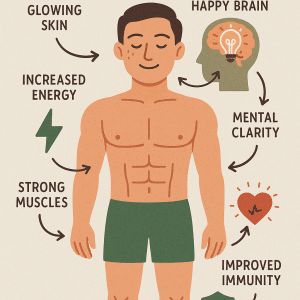
Defining Healthy Habits for Holistic Well-Being
When we talk about healthy lifestyle habits, we’re referring to daily actions and choices that support sustained well-being both inside and out. It’s not just about what you eat or how often you exercise — it’s a combination of factors like nutrition, hydration, physical activity, sleep, mental health, social connections, and avoidance of harmful substances.
In other words, it’s holistic health. This means looking after your body, mind, and social needs altogether. Healthy habits empower you to prevent chronic diseases, boost energy, and enhance your overall quality of life. For health-conscious adults seeking natural wellness, these habits feel less like chores and more like rituals that connect you with your best self.
The Science Behind Sustainable Healthy Lifestyle Choices
Science backs up the importance of these habits. For instance, studies show that balanced nutrition paired with regular physical activity lowers your risk of heart disease, cancer, and diabetes. Hydration impacts cognitive function and mood. Quality sleep promotes immune health and reduces inflammation.
Moreover, stress management techniques like mindfulness meditation actually alter brain regions linked to emotional regulation. Social connections stimulate the immune system and help fight depression. The takeaway? Incorporating daily healthy lifestyle tips for natural well-being is essential for long-term health — and it’s achievable!
The Foundations of Healthy Lifestyle Habits: Nutrition and Hydration
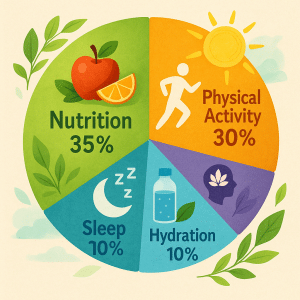
Embracing Balanced Nutrition for Physical and Mental Health
A cornerstone of healthy lifestyle habits is nutrition. Embracing a balanced diet rich in whole foods fuels your body and supports mental clarity.
Incorporating Whole Foods, Fruits, and Vegetables
Incorporate plenty of colorful fruits and vegetables into your meals — think leafy greens, berries, cruciferous veggies, and bright peppers. These foods are packed with antioxidants, vitamins, and fiber that boost your immune system and reduce chronic inflammation.
Whole grains like quinoa, brown rice, and oats provide steady energy, while lean proteins such as fish, chicken, beans, and nuts maintain muscle health and satiety. Remember, eating fresh and minimally processed foods naturally lowers your intake of unhealthy fats, salts, and sugars.
Reducing Processed Foods and Added Sugars Naturally
Cutting down on processed foods and added sugars can feel overwhelming, but aim for gradual changes. Replace sugary snacks with nuts or fruit, swap sodas for flavored water with a splash of lemon, and cook at home more often. These steps improve blood sugar control and heart health without sacrificing flavor or enjoyment.
Hydration Tips for Optimal Body and Brain Function
Water is life, literally. Staying hydrated supports everything from digestion to skin health and brain performance.
Water-Rich Foods and Their Role in Daily Hydration
Besides drinking water, eating water-rich foods like cucumbers, watermelon, oranges, and celery helps maintain hydration levels. Including these in your diet is a clever way to stay hydrated, especially if you find plain water boring.
Recognizing Signs of Dehydration and How to Prevent Them
Common dehydration symptoms include fatigue, headaches, dry mouth, and dark urine. To prevent this, drink water throughout the day rather than gulping large amounts at once. Carry a reusable water bottle and set reminders on your phone if needed.
Physical Activity: Building Movement into Your Daily Routine
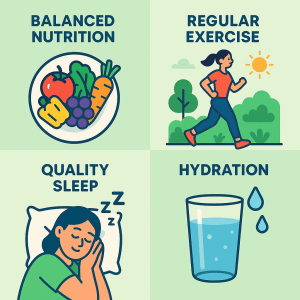
Benefits of Regular Aerobic Exercise for Cardiovascular Health
Regular aerobic activity like walking, jogging, cycling, and swimming strengthens your heart, lowers blood pressure, and improves lung capacity. Even moderate exercise boosts mood by releasing feel-good endorphins. For adults aiming at natural wellness, this is a must.
Low-Impact Activities Perfect for All Fitness Levels
If high-impact workouts aren’t your style, that’s okay! Yoga, Pilates, water aerobics, and tai chi provide gentle movement that increases flexibility, balance, and strength with minimal joint stress.
Strength Training for Longevity and Metabolic Health
Resistance training supports muscle mass retention as we age, improving metabolism and bone density. Incorporate bodyweight exercises like squats and push-ups or light weights two to three times a week for lasting benefits.
Practical Ways to Increase Physical Activity Without Overwhelm
Fit exercise into your routine by taking the stairs, walking your dog longer, doing mini workouts during TV commercials, and stretching first thing in the morning. Small, consistent actions add up fast!
Prioritizing Quality Sleep and Effective Sleep Hygiene Habits
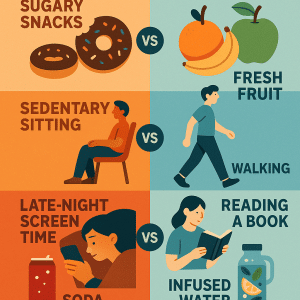
Why Adequate Sleep Is Essential for Natural Wellness
Sleep is often overlooked but vital to healthy lifestyle habits. It’s the time your body repairs tissues, consolidates memories, and balances hormones. Poor sleep links to obesity, depression, and weakened immunity.
Strategies for Establishing a Consistent Sleep Schedule
Set a regular bedtime and wake-up time—even on weekends—to regulate your internal clock. Limit caffeine and heavy meals in the evening, and develop a relaxing pre-sleep ritual such as reading or gentle stretching.
Sleep Environment Optimization for Restorative Sleep
Make your bedroom a sanctuary: cool, dark, and quiet. Invest in a comfortable mattress and keep electronic devices out of reach. Blackout curtains and white noise machines can also enhance sleep quality.
Stress Management Techniques to Support Mental and Physical Health
Mindfulness Meditation and Relaxation Practices
Mindfulness meditation, a powerful stress reduction method, helps you stay present and calm, reducing anxiety and lowering blood pressure. Start with just five minutes daily and gradually lengthen sessions.
Incorporating Breathing Exercises and Progressive Muscle Relaxation
Simple breathing exercises stimulate your parasympathetic nervous system, promoting relaxation. Progressive muscle relaxation systematically tenses and releases muscle groups to ease tension.
The Role of Nature and Digital Detox in Stress Reduction
Spending time outdoors in nature boosts mood and lowers cortisol levels. Likewise, a digital detox reduces information overload and tech-related anxiety, giving your brain room to breathe.
Cultivating Healthy Social Relationships for Emotional Wellness
The Impact of Social Connections on Immune and Mental Health
Strong social bonds are linked to lower inflammation, better immunity, and reduced mortality risk. Positive relationships provide emotional support essential for resilient mental well-being.
Ways to Nurture Meaningful Relationships in a Busy World
Make time for regular calls, meet ups, or shared hobbies. Practice active listening and empathy to deepen your connections. Even small acts of kindness can strengthen your social network.
Avoiding Harmful Habits: Smoking, Excessive Alcohol, and Poor Lifestyle Choices
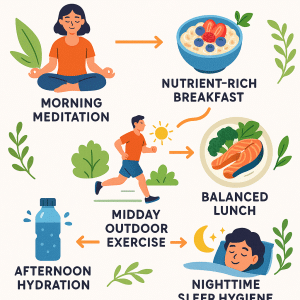
How a Smoke-Free Lifestyle Enhances Long-Term Well-Being
Quitting smoking reduces your risk of heart disease, stroke, lung cancer, and improves lung function. It’s one of the most impactful healthy lifestyle habits to adopt.
Moderating Alcohol Consumption for Natural Health Benefits
Moderate alcohol intake—such as one drink per day for women and two for men—may offer heart benefits. Excessive consumption, however, increases risks for liver disease, certain cancers, and mental health disorders. Staying mindful is key.
Strengthening Immune System through Healthy Lifestyle Habits
Nutrition and Exercise Synergy in Immune Support
A diet rich in vitamin C, zinc, and probiotics plus regular moderate exercise primes your immune defenses and reduces illness duration.
Sleep and Stress Balance as Immune Enhancers
Quality sleep and low stress add extra layers of immune protection by regulating inflammation and hormone balance.
Maintaining a Clean and Organized Environment for Holistic Health
How Your Surroundings Influence Mental Clarity and Wellness
A tidy, clutter-free space reduces anxiety and improves focus. Natural light and indoor plants enhance air quality and mood.
Simple Habits for Daily Environment Care and Organization
Spend five minutes each day decluttering, open windows for fresh air, and integrate cleaning into your routine to create a serene sanctuary.
Tracking Progress: Building Healthy Habits for Long-Term Success
Setting Realistic, Measurable Wellness Goals
Small goals like “I’ll walk 15 minutes daily” instead of vague ones help build momentum and confidence.
Using Journals, Apps, and Habit-Tracking Tools Effectively
Track your habits using apps like Habitica or a simple journal to celebrate wins and stay accountable.
Integrating Healthy Lifestyle Habits into Busy Schedules Naturally
Time Management Tips for Consistent Wellness Routines
Prioritize wellness like meetings—schedule workout times and meal prep. Use batch cooking and plan activities with friends to stay motivated.
Prioritizing Self-Care Amid Professional and Personal Demands
Remember, self-care isn’t selfish. Taking care of yourself enables you to show up better for others and your goals.
Unique Holistic Approach: Connecting Gut Health with Overall Wellness
The Gut-Brain Axis and Its Role in Mental and Physical Health
Gut health influences mood, immune response, and digestion through the gut-brain axis — a complex communication system between your gut microbiome and brain.
Natural Ways to Support Gut Microbiome Through Lifestyle Habits
Consume fermented foods like yogurt, kefir, and sauerkraut, increase dietary fiber, reduce stress, and avoid unnecessary antibiotics to nurture your gut flora.
Key Points: Quick Takeaways on Healthy Lifestyle Habits
- Balanced nutrition rich in whole foods and reduced processed sugars supports immune and mental health.
- Staying hydrated with water and water-rich foods enhances physical and cognitive function.
- Regular physical activity, including aerobic and strength training, improves cardiovascular health and longevity.
- Prioritize quality sleep by following consistent schedules and optimizing your sleep environment.
- Manage stress through mindfulness, breathing exercises, nature exposure, and digital detoxes.
- Nurturing social connections strengthens emotional wellness and immunity.
- Avoid smoking and moderate alcohol consumption to reduce chronic disease risks.
- Strengthen your immune system synergistically via diet, exercise, sleep, and stress balance.
- Maintain a clean, organized living environment to promote mental clarity and reduce anxiety.
- Set realistic health goals and use tracking tools to build long-lasting habits.
- Integrate wellness practices into your busy life with smart time management and prioritization.
- Support your gut health naturally for comprehensive mental and physical wellness.
Conclusion: Embracing Healthy Lifestyle Habits for Sustainable Natural Wellness
So, there you have it — 15 powerful healthy lifestyle habits that can genuinely transform your life. As a health-conscious adult seeking natural wellness, it’s essential to view these habits as an interconnected tapestry rather than isolated actions. When combined, they create a robust foundation for vibrant energy, longevity, and emotional balance.
Remember, progress is a journey, not a sprint. Don’t be discouraged by setbacks; every small change counts. Start with one or two habits, and gradually add more as they become natural parts of your daily rhythm. Celebrate your wins and stay curious—your body and mind will thank you.
I encourage you to take these healthy lifestyle habits to heart and tailor them in ways that resonate with your unique lifestyle and preferences. Your well-being is worth the investment. So, why wait? Begin today to sculpt a healthier, happier, and more balanced you — naturally.
To your lasting health and happiness!
Frequently Asked Questions (FAQs)
1. What are the best healthy lifestyle habits for adults to improve wellness?
The best healthy lifestyle habits for adults include balanced nutrition, regular physical activity, adequate sleep, effective stress management, hydration, and nurturing social relationships. These habits collectively support mental and physical health naturally.
2. How can I build healthy habits for long-term health without feeling overwhelmed?
Start small with achievable goals, like a 10-minute walk or adding an extra vegetable to meals. Use journals or apps to track progress and maintain motivation. Consistency over perfection is the key to sustainable healthy lifestyle habits.
3. What are some natural ways to maintain a healthy lifestyle daily?
Natural ways to maintain a healthy lifestyle include eating whole foods, drinking enough water, engaging in enjoyable physical activities, practicing mindfulness, getting consistent sleep, and spending time in nature.
4. How important is sleep hygiene for better health and wellness?
Sleep hygiene is crucial for physical repair, cognitive function, mood regulation, and immune support. Simple habits such as a fixed sleep schedule, a dark quiet environment, and avoiding screens before bed enhance restorative sleep.
5. Can social connections really impact my health-conscious lifestyle?
Absolutely! Healthy social connections reduce stress, boost your immune system, and improve mental health. Prioritizing meaningful relationships supports overall natural wellness and should be part of your daily healthy lifestyle habits.
For further resources on natural wellness and lifestyle habits, check reputable health organizations like the American Heart Association and Centers for Disease Control and Prevention. You’ll also find apps like Habitica excellent for habit tracking.
Embrace these healthy lifestyle habits, and let’s journey together toward a naturally well and vibrant life!

